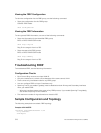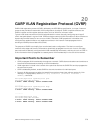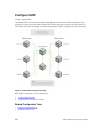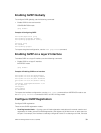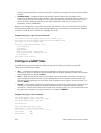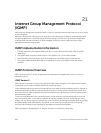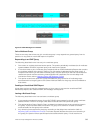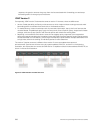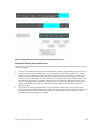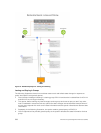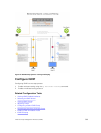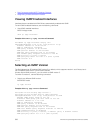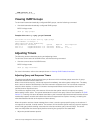21
Internet Group Management Protocol
(IGMP)
Internet group management protocol (IGMP) is a Layer 3 multicast protocol that hosts use to join or leave
a multicast group.
Multicast is premised on identifying many hosts by a single destination IP address; hosts represented by
the same IP address are a multicast group. Multicast routing protocols (such as protocol-independent
multicast [PIM]) use the information in IGMP messages to discover which groups are active and to
populate the multicast routing table.
IGMP Implementation Information
• The Dell Networking OS supports IGMP versions 1, 2, and 3 based on RFCs 1112, 2236, and 3376,
respectively.
• The system does not support IGMP version 3 and versions 1 or 2 on the same subnet.
• Dell Networking switches cannot serve as an IGMP host or an IGMP version 1 IGMP Querier.
• The system automatically enables IGMP on interfaces on which you enable a multicast routing
protocol.
IGMP Protocol Overview
IGMP has three versions. Version 3 obsoletes and is backwards-compatible with version 2; version 2
obsoletes version 1.
IGMP Version 2
IGMP version 2 improves on version 1 by specifying IGMP Leave messages, which allows hosts to notify
routers that they no longer care about traffic for a particular group.
Leave messages reduce the amount of time that the router takes to stop forwarding traffic for a group to
a subnet (leave latency) after the last host leaves the group. In version 1 hosts quietly leave groups, and
the router waits for a query response timer several times the value of the query interval to expire before it
stops forwarding traffic.
To receive multicast traffic from a particular source, a host must join the multicast group to which the
source is sending traffic. A host that is a member of a group is called a receiver. A host may join many
groups, and may join or leave any group at any time. A host joins and leaves a multicast group by sending
an IGMP message to its IGMP Querier. The querier is the router that surveys a subnet for multicast
receivers and processes survey responses to populate the multicast routing table.
IGMP messages are encapsulated in IP packets, as shown in the following illustration.
384
Internet Group Management Protocol (IGMP)



